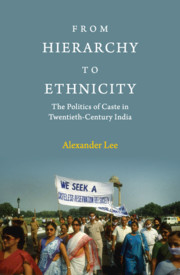Book contents
- Frontmatter
- Dedication
- Contents
- List of Tables
- List of Figures
- Acknowledgements
- 1 Introduction
- 2 Explaining Identity Activism
- 3 Caste in Historical Context
- 4 Caste in the Census of India
- 5 The Causes of Ranked Rhetoric
- 6 Caste since Independence
- 7 Conclusion
- Appendix A Data
- Appendix B Statisical Tests
- Appendix C Additional Tables and Figures
- Bibliography
- Index
6 - Caste since Independence
Published online by Cambridge University Press: 14 January 2020
- Frontmatter
- Dedication
- Contents
- List of Tables
- List of Figures
- Acknowledgements
- 1 Introduction
- 2 Explaining Identity Activism
- 3 Caste in Historical Context
- 4 Caste in the Census of India
- 5 The Causes of Ranked Rhetoric
- 6 Caste since Independence
- 7 Conclusion
- Appendix A Data
- Appendix B Statisical Tests
- Appendix C Additional Tables and Figures
- Bibliography
- Index
Summary
At the time the colonial census officials finally began to accede to the demands of the caste petitioners, British rule in India was clearly nearing its close – indeed, much of the electoral jockeying of the caste associations was bent on filling the political space that the decline of the Raj opened up. India's independence changed the formal attitude of state institutions towards the caste system from curiosity to strident hostility, and the political system from a curious colonial hybrid to a democracy with universal suffrage. Over time, the policies of the post-independence state would also change the distribution of wealth and education among social groups.
The development of caste identities during these decades presents a paradoxical picture. On the one hand, it was clear that certain public expressions of caste identity that had been important in the colonial period were in precipitous decline. Elite opinion in India, at least in public, has turned against the caste hierarchy as a legitimator for social and political inequality, and even as a legitimate social affinity or object of intellectual analysis. The census no longer tabulates jati populations, both eliminating it as a focus for public contestation and dramatically limiting our ability to make reliable quantitative generalizations about this period compared to the one before. The practice of untouchability, once nearly universal, has undergone a precipitous decline, especially in urban areas. Lower caste candidates routinely win elected office, and upper caste voters routinely court lower caste support, which they know they cannot take for granted. The formal advertisement of claims to high caste status is also much less common than it once was; if anything, it is now more common for castes to claim to be ‘backward’.
On the other hand, despite the hopes of some reformers of the independence generation, it is clear that caste has not withered away – in fact, in some respects, caste identities appear more salient now than they were in the colonial period. During the 1990s, explicitly caste-based political parties became electorally successful in some northern states, and the controversy over caste-based quotas in reservation and public employment made caste a more noticeable element of political contention it had been in the 1950s and 1960s. Caste associations remain prominent, still dabbling in electoral politics and conducting campaigns for the social betterment of the caste.
- Type
- Chapter
- Information
- From Hierarchy to EthnicityThe Politics of Caste in Twentieth-Century India, pp. 132 - 168Publisher: Cambridge University PressPrint publication year: 2020

